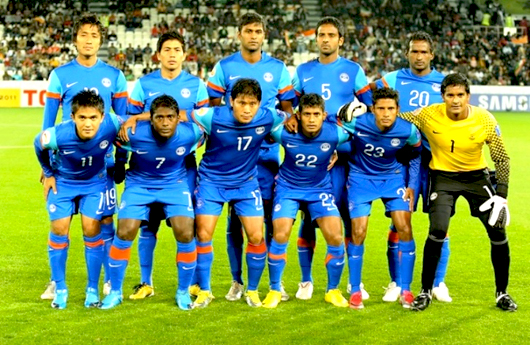Kathmandu, Mar 19: The Indian football team has managed to find a place in the second round of the 2018 FIFA World Cup football qualifiers by holding off the dominant Nepal team with a draw. The aggregate score is 2-0 in India’s favour.
India is now one of the 40 teams in the continent who will battle in the second round of the world cup qualifiers. According to the format, the 40 teams will be drawn into eight groups of five teams each and will compete in a double round-robin format.
The round two qualifiers are to last for nearly 10 months between June 11 and March 29 next year. Out of the 40 teams, as total of 12 teams (group winners and four best runners-up) will be selected for the round 3 of the qualifiers as well as the 2019 Asian Cup finals.
The overall performance of both the teams wasn’t jawdropping, but it did have a few thrilling moments as a disallowed goal for the visitors and an off-the-post strike from Nepal kept the spectators on the edge of their seats at the Dashrath Rangasala Stadium.
India wasn’t able to convert a few chances as striker Sunil Chhetri’s long ranger was off target and then Robin Singh’s shot fizzed over the bar five minutes into the game.
Nepal pushed on the offensive soon after the match started with forward Shantosh Sahukala creating a chance in the 18th minute as he headed the ball inside the box. But the ball was collected by India custodian Subrata Paul before it could find its way to a red Nepali shirt.
Bikram Lama and Shahukhala stitched together some superb balls for striker Bimal Gharti Magar but the Indian rear-guard stood strong as defender Arnab Mondal lunged in for a few strong challenges.
Magar came close to a breakthrough a minute before half-time but could not beat Paul from close range.
After the half time, both sides went on the offensive with Indians planting in crosses from the flanks and into the opponent’s defensive third while Shahukhala continued to torment the visiting defenders.
In the 64th minute, Robin put the ball into the net but the referee disallowed the goal, leaving India dumbstruck. Chhetri next tried a right-footer after dribbling past a maze of defenders but his shot was wide off-target.
At the other end of the pitch, Paul was left stranded as Sandip Rai chipped his free-kick over the wall to Bharat Khawas who only managed to find the post, much to the Indians’ relief.
Eight minutes from time, Paul had to pull off a brilliant save to thwart Rai’s attempt, thus ensuring a passage to the Asian and World Cup qualifiers.






Comments
Add new comment